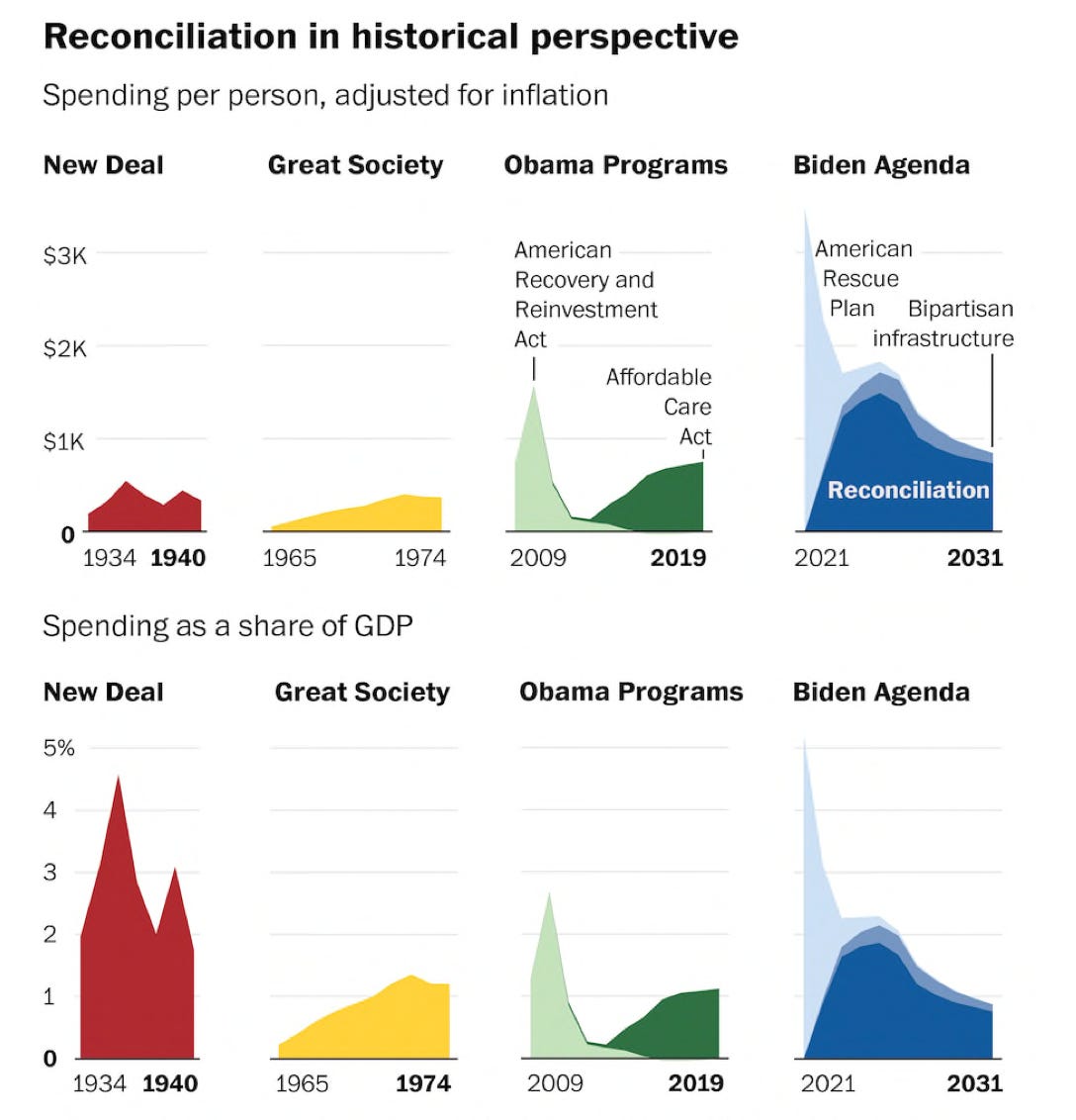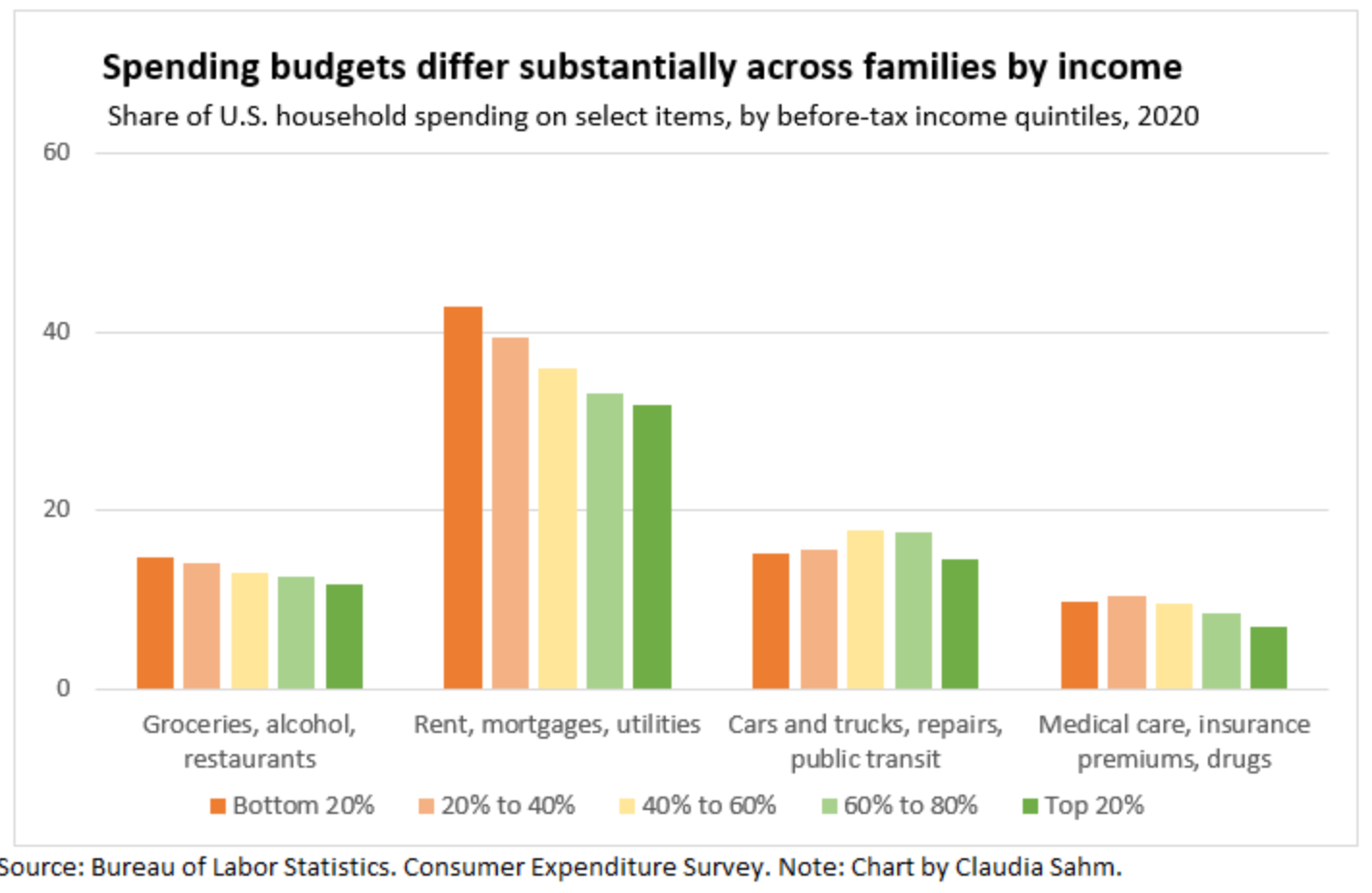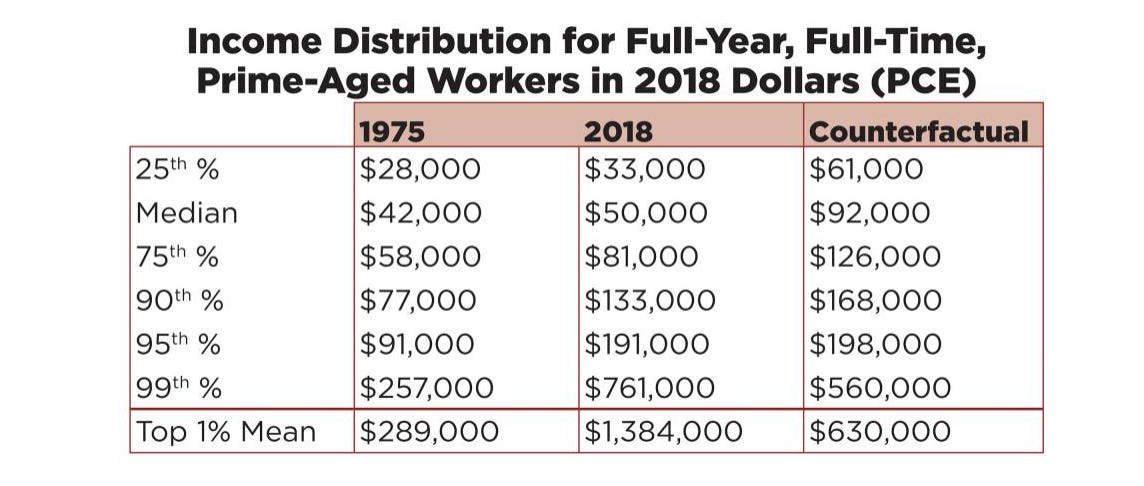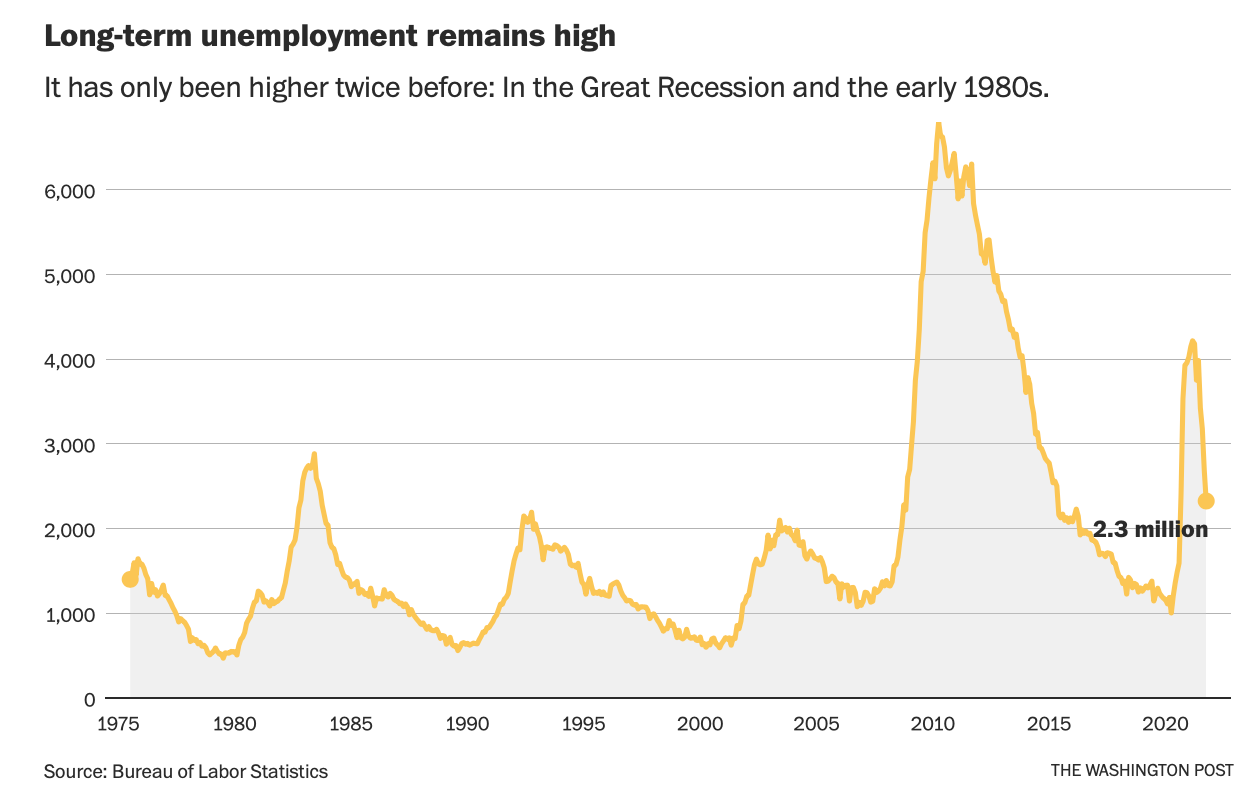Friends,
At Civic Ventures, one of our most important missions is to finally dismantle the concept of trickle-down economics, which captured the hearts of lawmakers in the federal government and state houses across the country about four decades ago. It’s hard to believe today, but the economic philosophy of allowing wealthy Americans and corporations to hoard as much wealth as possible in the hopes that it would “trickle down” to everyone else in the form of jobs was for decades considered unassailable dogma among Republicans and Democrats. Though we’ve made a lot of progress in recent years, the ghost of trickle-down continues to rise from the grave—and it looks as though it will haunt the political discussion in 2022.
Jon Talton at the Seattle Times published an excellent overview of the pernicious ways some Congressional Democrats are reinserting trickle-down into the Build Back Better legislation, watering down some of our most meaningful paths to taxing the wealthy. And here where I live in Washington state, a handful of wealthy people (and a notorious anti-tax pest) are working hard to try to beat back the state’s first-ever modest tax on extraordinary capital gains profits, both in the courts and at the ballot box. It seems hard to believe that anyone can take the idea of tax cuts for the wealthy as a lever to economic growth seriously anymore. But a lot of super-rich Americans have constructed messaging machines solely for that purpose, and it’s easier than ever to drown out reality with a noisy message. Make no mistake—we’ve shown remarkable progress in our fight, and the Biden Administration has demonstrated a real conviction to consign trickle-down to the dustbin of history. But the idea is still out there, and we have to be vigilant in our quest to fight it whenever it reappears.
The Latest Economic News and Updates
Building Back Better is all we want for Christmas
Last week, Democrats and a few Republicans in the House finally sent the infrastructure bill to President Biden’s desk to sign, while leaving the progressive Build Back Better legislation, which offers a number of social service and other so-called “soft-infrastructure” programs, behind for more deliberation. “The new law promises to reach almost every corner of the country,” Mary Clare Jalonick writes for the AP about the infrastructure bill. “It’s a historic investment that the president has compared to the building of the transcontinental railroad and Interstate Highway System. The White House is projecting that the investments will add, on average, about 2 million jobs per year over the coming decade.”
The passage of the infrastructure bill is a huge deal—something that the last few presidents talked about at length but couldn’t manage to pass. But it’s not enough. It is essential that Congress continues to move forward with the progressive Build Back Better legislation and its paid family leave, affordable childcare, and improved health care. Even though the fight will no doubt be complicated, arduous, and vicious, it’s essential to building a future with more equitable economic growth—as Heather Long reports for the Washington Post: “Estimates from independent groups such as Oxford Economics and Moody’s Analytics predict the pace of growth will be higher and the number of people working will increase in the coming years if these bills are signed into law, largely because their models forecast that the gains from higher productivity and more women working will be greater than any drag from the tax increases to pay for the initiatives.”
One graph from Long’s article also helps put the spending of the infrastructure and Build Back Better bills in perspective by comparing them to other historically large government programs. The spending per person is high in comparison, but that spending serves as an investment in the economy, as demonstrated by the bottom graph showing spending as a share of GDP:
The inflation number that matters most for the American people
Felix Salmon and Hans Nichols report for Axios that most of America’s economic indicators are doing quite well, with the economy growing by 5.7 percent this year, checking accounts growing by 50 percent over pre-pandemic numbers, earnings up almost five percent annually, six million jobs created in this year alone, and a booming stock market. So why don’t the American people think the economy is succeeding? After all, some 57 percent of voters characterize the economy as “weak,” a number that has climbed significantly since June. The long answer is complex, and Paul Krugman just wrote a great piece unpacking how the American people feel about the economy. But in short, the answer is inflation. Gas prices are very high over this time last year—unsurprising, since Americans are traveling more than they were during the pandemic—and Americans are spending more in grocery stores and seeing higher price tags elsewhere.
If inflation is the key, America’s feelings about the economy aren’t likely to improve anytime soon. Yesterday, the Associated Press reported that consumer prices climbed by 6.2 percent in October—the highest inflation rate since 1990. The fact is that inflation isn’t just an American problem—it’s happening all over the world. Brazil’s inflation has skyrocketed, Japan just hit a 40-year inflation high, and China is suffering through unprecedented price increases right now. Inflation has happened before in this situation, too: The historical record shows that prices in America spiked after the Spanish Flu epidemic of 1918, before plunging over the following years. And corporate profits continue to soar despite inflationary pressures, which indicates that it’s not an economy-wide issue yet. But the fact is that American families are paying more pretty much everywhere, and none of this historical or international context is lowering their bills. Claudia Sahm wrote an excellent newsletter exploring which Americans are being hurt by rising prices right now. She found that wealthy families are paying higher prices than poor families, but everything always takes a larger share of your income to get by when you’re poor:
For what it’s worth, Catherine Rampell highlighted the number that I find most disturbing in this week’s data drop: “after adjusting for today’s new inflation numbers, average hourly wages fell 1.2% from Oct 2020 to Oct 2021.” That’s the number which indicates that the American people are hurting, and it’s the number that will have the most influence over how people feel about the economy. If I were an economic advisor to the Biden Administration, I would emphasize the importance of raising wages in conjunction with all the other policies that might help with supply-chain issues and global inflation. Rising prices don’t have as big an impact on your life if your paycheck is growing faster.
Growing American paychecks is the most important economic policy
With all the above information in mind, how can the Biden Administration improve the economy for average Americans? The most important thing the president could do is start to claw back a significant portion of the $50 trillion that the wealthiest one percent of Americans have taken from the bottom 90 percent since the 1970s. That’s money that used to go to the average American paycheck—and returning that money to the middle class, in the form of higher wages and investments into communities, would go a long way toward taking the pain off those higher prices. (I was blown away by Employ America’s recent report on real wages and how it’s possible that the American people have lost so much over such a relatively short amount of time without feeling it. The cake factory analogy in the report is an elegant explanation of the “aggregation problem,” which happens when you try to look at individual outcomes through macro economic trends.) Look at how slowly paychecks for all but the wealthiest Americans have grown over the last four decades, and how high those paychecks would have grown had income growth continued as it did for most of the 20th century, in the “Counterfactual” column:
Another important step that our leaders could make to lower prices and improve outcomes for ordinary Americans? They could lead the fight against corporate concentration, as a new Roosevelt Institute report from Niko Lusiani argues: “To lower families’ bills in lasting ways, policymakers must address two of those less-explored but long-standing problems that predate the pandemic: concentrated market power and chronic public underinvestment in our care, housing, and renewable energy infrastructure.” The report says that if the Biden Administration takes action against corporate consolidation, they could “increase the purchasing power of the average family by $5,000 per year.”
Are we doing a good job on jobs?
As many economists suspected, October delivered strong jobs numbers, adding more than half a million jobs to the economy and lowering the unemployment rate to 4.6 percent. America has now recovered 80 percent of the jobs lost during the pandemic. The leisure and hospitality sector, which has been sluggish as Americans struggled with pandemic surges, gained a healthy 164,000 jobs. Much of the slowness we’ve seen in workers getting back on the job have to do with a detente between employers and job applicants, reports the Washington Post’s Heather Long: Some employers are demanding unrealistic prior experience and not meeting calls for higher pay, while applicants simply don’t want to go back on the job if bosses expect them to abide by the same pre-pandemic expectations for work-life balance. And in general, there’s a lot more to be done—Black unemployment remains stubbornly at 7.8 percent, for example, and nearly four and a half million workers are still outside the labor force due to pandemic pressures, as you can see in the long-term unemployment graph below—but the trends are pointing in the right direction.
Now, as we head into what looks to be a bustling holiday season, the New York Times’s Sapna Maheshwari and Michael Corkery report on what retailers are doing to attract workers for the holiday rush. They say that “seasonal workers will see higher pay than usual,” and there will be more of them: “The National Retail Federation, an industry group, is anticipating record holiday sales and has forecast that retailers will hire 500,000 to 665,000 seasonal workers, significantly more than the 486,000 in 2020.” More workers, earning bigger paychecks in the busiest retail season of the year? That sounds like a recipe for economic growth if ever I heard one.
From McDonald’s to the New York Times to Kaiser Permanente, workers are walking out
#Striketober may have ended a couple weeks ago, but worker power is still on the rise. After decades of tilting the playing field against workers under presidents of both parties, big corporations have finally lost leverage during the pandemic to workers, who are finally able to make gains around the country. Fast food workers everywhere are walking off the job, demanding higher pay and more humane working conditions. Reporters at the New York Times’s popular Wirecutter consumer reports division are threatening a walkout during peak holiday shopping season over a contract dispute. And more than 30,000 Kaiser Permanente nurses and health care professionals are on the verge of striking. This hopefully represents a generational shift, an attempt to rebalance the scales of power so that workers again have control over their own destinies. Here’s looking forward to #Strikesgiving and a merry #Strikemas, and onward into a worker-powered 2022.
Real-Time Economic Analysis
Civic Ventures provides regular commentary on our content channels, including analysis of the trickle-down policies that have dramatically expanded inequality over the last 40 years, and explanations of policies that will build a stronger and more inclusive economy. Every week I provide a roundup of some of our work here, but you can also subscribe to our podcast, Pitchfork Economics; sign up for the email list of our political action allies at Civic Action; subscribe to our Medium publication, Civic Skunk Works; and follow us on Twitter and Facebook.
On Civic Action Live this week, we’ll be discussing the dramatic shift in worker power that has taken place over the last few months, what the Build Back Better plan needs to be truly successful, and what the latest inflation numbers mean. We’ll also be taking your questions and fielding your comments in real time.
On the Pitchfork Economics podcast, tax law expert Dorothy A. Brown joins Nick and Goldy to discuss the many ways that the tax code was established to advantage wealthy white Americans at the expense of Black taxpayers. Brown offers practical advice for young Black families on how to make the tax code fairer for them, and she also offers an overview of what might finally bring some real equity to the tax code.
In his Business Insider column, Paul discusses America’s fentanyl epidemic and how it exemplifies everything wrong with free-market economics, and why stellar drug journalist Sam Quinones says “certain corporations behave like drug traffickers, and drug traffickers behave like corporations.”
Closing Thoughts
This newsletter is coming to you on Veteran’s Day, and I hope that you, like those of us at Civic Ventures, are taking some time today to reflect on national service—what it means to devote your life to a cause not out of monetary gain but because you want to protect and give something back to your community. Americans understand that our veterans sacrificed for our benefit, and we unambiguously support them—a bipartisan civic agreement that surpasses virtually every other.
As of April of this year, some 19 million veterans of wars are living in the United States. Nearly six million of them served in the Vietnam War and almost eight million in the Gulf Wars. Fewer than a quarter million World War II veterans are still with us, and just under a million Korean War veterans. Around eleven percent of those living veterans are women. These are fathers and sons, mothers and daughters, neighbors and friends. If you’re among these numbers and you’re reading this, I want to thank you for your service, and I also want to thank you for continuing to work toward a better, more inclusive America as a citizen. Your service is an inspiration.
Be kind. Be brave. Mask up. Get vaccinated.
Zach







